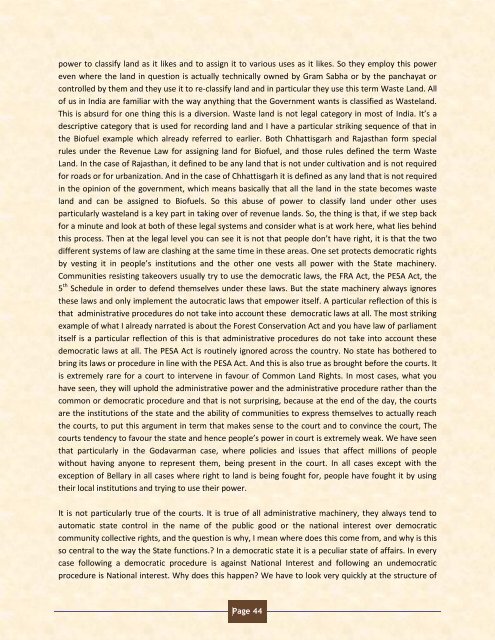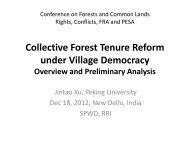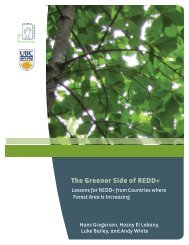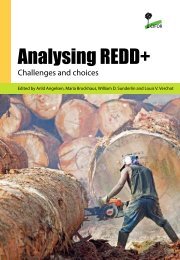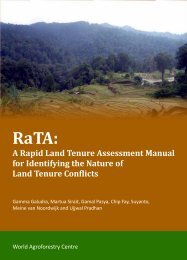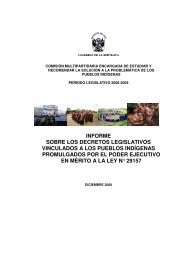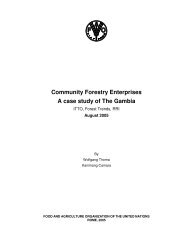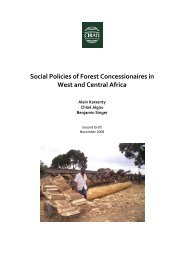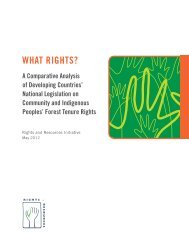Concept Note - Rights and Resources Initiative
Concept Note - Rights and Resources Initiative
Concept Note - Rights and Resources Initiative
Create successful ePaper yourself
Turn your PDF publications into a flip-book with our unique Google optimized e-Paper software.
power to classify l<strong>and</strong> as it likes <strong>and</strong> to assign it to various uses as it likes. So they employ this power<br />
even where the l<strong>and</strong> in question is actually technically owned by Gram Sabha or by the panchayat or<br />
controlled by them <strong>and</strong> they use it to re-classify l<strong>and</strong> <strong>and</strong> in particular they use this term Waste L<strong>and</strong>. All<br />
of us in India are familiar with the way anything that the Government wants is classified as Wastel<strong>and</strong>.<br />
This is absurd for one thing this is a diversion. Waste l<strong>and</strong> is not legal category in most of India. It’s a<br />
descriptive category that is used for recording l<strong>and</strong> <strong>and</strong> I have a particular striking sequence of that in<br />
the Biofuel example which already referred to earlier. Both Chhattisgarh <strong>and</strong> Rajasthan form special<br />
rules under the Revenue Law for assigning l<strong>and</strong> for Biofuel, <strong>and</strong> those rules defined the term Waste<br />
L<strong>and</strong>. In the case of Rajasthan, it defined to be any l<strong>and</strong> that is not under cultivation <strong>and</strong> is not required<br />
for roads or for urbanization. And in the case of Chhattisgarh it is defined as any l<strong>and</strong> that is not required<br />
in the opinion of the government, which means basically that all the l<strong>and</strong> in the state becomes waste<br />
l<strong>and</strong> <strong>and</strong> can be assigned to Biofuels. So this abuse of power to classify l<strong>and</strong> under other uses<br />
particularly wastel<strong>and</strong> is a key part in taking over of revenue l<strong>and</strong>s. So, the thing is that, if we step back<br />
for a minute <strong>and</strong> look at both of these legal systems <strong>and</strong> consider what is at work here, what lies behind<br />
this process. Then at the legal level you can see it is not that people don’t have right, it is that the two<br />
different systems of law are clashing at the same time in these areas. One set protects democratic rights<br />
by vesting it in people’s institutions <strong>and</strong> the other one vests all power with the State machinery.<br />
Communities resisting takeovers usually try to use the democratic laws, the FRA Act, the PESA Act, the<br />
5 th Schedule in order to defend themselves under these laws. But the state machinery always ignores<br />
these laws <strong>and</strong> only implement the autocratic laws that empower itself. A particular reflection of this is<br />
that administrative procedures do not take into account these democratic laws at all. The most striking<br />
example of what I already narrated is about the Forest Conservation Act <strong>and</strong> you have law of parliament<br />
itself is a particular reflection of this is that administrative procedures do not take into account these<br />
democratic laws at all. The PESA Act is routinely ignored across the country. No state has bothered to<br />
bring its laws or procedure in line with the PESA Act. And this is also true as brought before the courts. It<br />
is extremely rare for a court to intervene in favour of Common L<strong>and</strong> <strong>Rights</strong>. In most cases, what you<br />
have seen, they will uphold the administrative power <strong>and</strong> the administrative procedure rather than the<br />
common or democratic procedure <strong>and</strong> that is not surprising, because at the end of the day, the courts<br />
are the institutions of the state <strong>and</strong> the ability of communities to express themselves to actually reach<br />
the courts, to put this argument in term that makes sense to the court <strong>and</strong> to convince the court, The<br />
courts tendency to favour the state <strong>and</strong> hence people’s power in court is extremely weak. We have seen<br />
that particularly in the Godavarman case, where policies <strong>and</strong> issues that affect millions of people<br />
without having anyone to represent them, being present in the court. In all cases except with the<br />
exception of Bellary in all cases where right to l<strong>and</strong> is being fought for, people have fought it by using<br />
their local institutions <strong>and</strong> trying to use their power.<br />
It is not particularly true of the courts. It is true of all administrative machinery, they always tend to<br />
automatic state control in the name of the public good or the national interest over democratic<br />
community collective rights, <strong>and</strong> the question is why, I mean where does this come from, <strong>and</strong> why is this<br />
so central to the way the State functions. In a democratic state it is a peculiar state of affairs. In every<br />
case following a democratic procedure is against National Interest <strong>and</strong> following an undemocratic<br />
procedure is National interest. Why does this happen We have to look very quickly at the structure of<br />
Page 44


